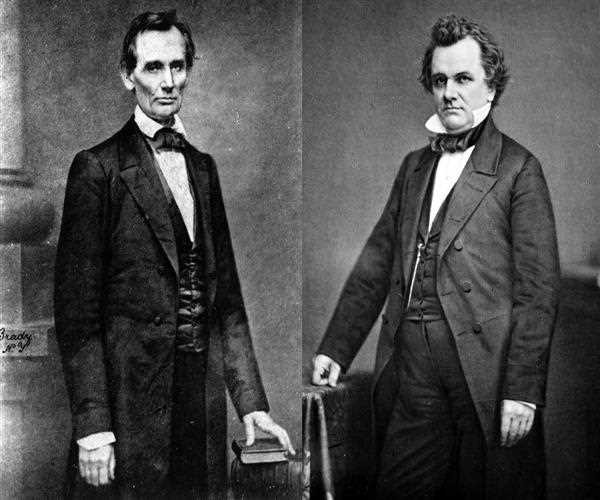Antiquarians have customarily respected the arrangement of seven verbal confrontations between Stephen A. Douglas and Abraham Lincoln amid the 1858 Illinois state decision battle as among the most noteworthy explanations in American political history. The issues they talked about were not just of basic significance to the sectional clash over subjection and states' rights yet additionally contacted further inquiries that would keep on influencing political talk. As Lincoln stated, the issues would be examined long after "these poor tongues of Judge Douglas and myself will be quiet."

What is regularly disregarded is that the level-headed discussions were a piece of a bigger crusade, that they were intended to accomplish certain prompt political goals, and that they mirrored the qualities of mid-nineteenth-century political talk. Douglas, an individual from Congress since 1843 and a broadly conspicuous representative for the Democratic party, was looking for re-election to a third term in the U.S. Senate, and Lincoln was running for Douglas' Senate situate as a Republican.
In view of Douglas' political stature, the crusade pulled in national consideration. Its result, it was thought, would decide the capacity of the Democratic party to keep up solidarity even with the disruptive sectional and subjugation issues, and some were persuaded it would decide the practicality of the Union itself. "The skirmish of the Union is to be battled in Illinois," a Washington paper announced.
Lincoln opened the battle on an inauspicious note, cautioning that the tumult over subjugation would not stop until the point that an emergency had been passed that came about either in the expansion of bondage to every one of the domains and states or in its definitive elimination. "A house partitioned against itself can't stand," he pronounced. Lincoln's conjecture was an announcement of what might be known as the irrepressible clash regulation. The risk of subjugation extension, he accepted, came not from the slaveholding South but rather from Douglas' prominent power position– enabling the domains to choose for themselves whether they wished to have servitude.
Moreover, Lincoln accused Douglas of planning to stretch out subjugation to the free states and also the domains, a false allegation that Douglas attempted vainly to overlook. Key to Lincoln's contention was his conviction that subjection must be managed as an ethical off-base. It damaged the announcement in the Declaration of Independence that all men are made equivalent, and it ran counter to the goals of the Founding Fathers. The "main problem" in his challenge with Douglas, Lincoln demanded, was the issue of good and bad, and he charged that his rival was attempting to maintain an off-base.
Douglas dismissed Lincoln's idea of an irrepressible clash and couldn't help contradicting his examination of the goals of the Founding Fathers, calling attention to that a considerable lot of them were slaveholders who trusted that every network ought to choose the inquiry for itself. A committed Jacksonian, he demanded that power ought to live at the neighborhood level and ought to mirror the desires of the general population.
He was persuaded, notwithstanding, that servitude would be successfully confined for financial, geographic, and statistic reasons and that the domains if permitted to choose, would be free.
In an imperative explanation at Freeport, he held that the general population could keep subjugation out of their domains, regardless of the Dred Scott choice, basically by withholding the assurance of the neighborhood law. Douglas was aggravated by Lincoln's push to determine a disputable good inquiry by political means, cautioning that it could prompt common war.
On decision day, the voters of Illinois picked individuals from the state lawmaking body who thusly re-chose Douglas to the Senate in January 1859. In spite of the fact that Lincoln lost, the Republicans got more well-known votes than the Democrats, flagging a critical move in the political character of the state.